Workplace Effectiveness: Legal and Ethical Frameworks in Childcare
VerifiedAdded on 2023/06/12
|30
|5401
|255
Homework Assignment
AI Summary
This assignment focuses on workplace effectiveness in the context of early childhood education, specifically addressing the codes, practices, and legislation that apply in the workplace. It covers the National Quality Standards, the United Nations Convention on the Rights of the Child, the ECA Code of Ethics, and the Early Years Learning Framework. The assessment includes true/false questions, matching workplace tasks with relevant legislation such as the Privacy Act, Family Law Reform Act, Racial Discrimination Act, Workplace Health and Safety Act, Child Protection Act, and the National Quality Framework. It further explores different frameworks like the Early Years Learning Framework (EYLF), My Time, Our Place: Framework for School Age Care (FSAC), and the Victorian Early Years Development Framework (VEYLF). The assignment also identifies legislation specifying favorable employment conditions for Early Childhood Educators, such as the Fair Work Act, Workplace Health and Safety Act, and Accident Compensation Act, and emphasizes the importance of reflection, professional development, and ethical practices.
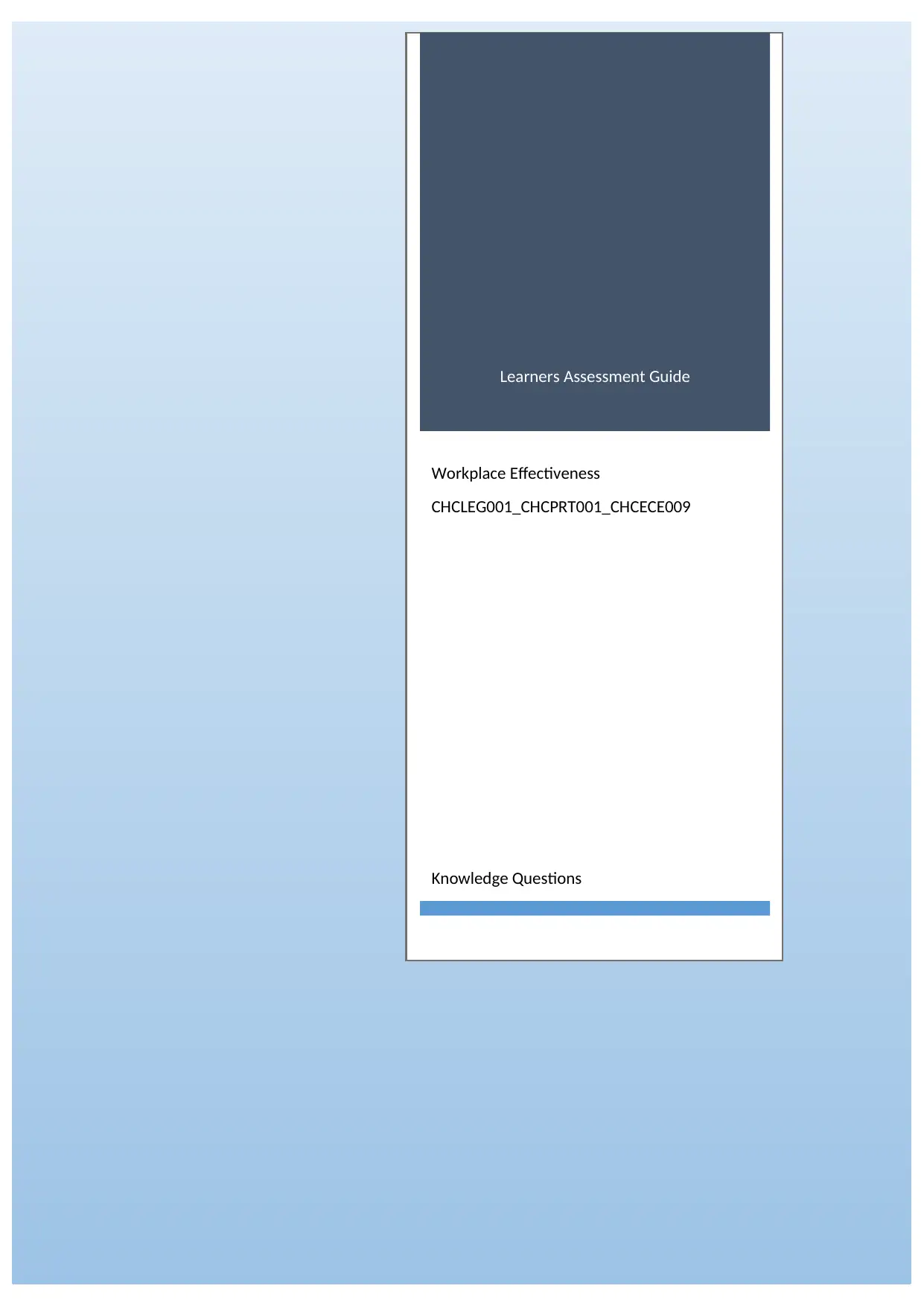
Learners Assessment Guide
Workplace Effectiveness
CHCLEG001_CHCPRT001_CHCECE009
Knowledge Questions
Workplace Effectiveness
CHCLEG001_CHCPRT001_CHCECE009
Knowledge Questions
Paraphrase This Document
Need a fresh take? Get an instant paraphrase of this document with our AI Paraphraser
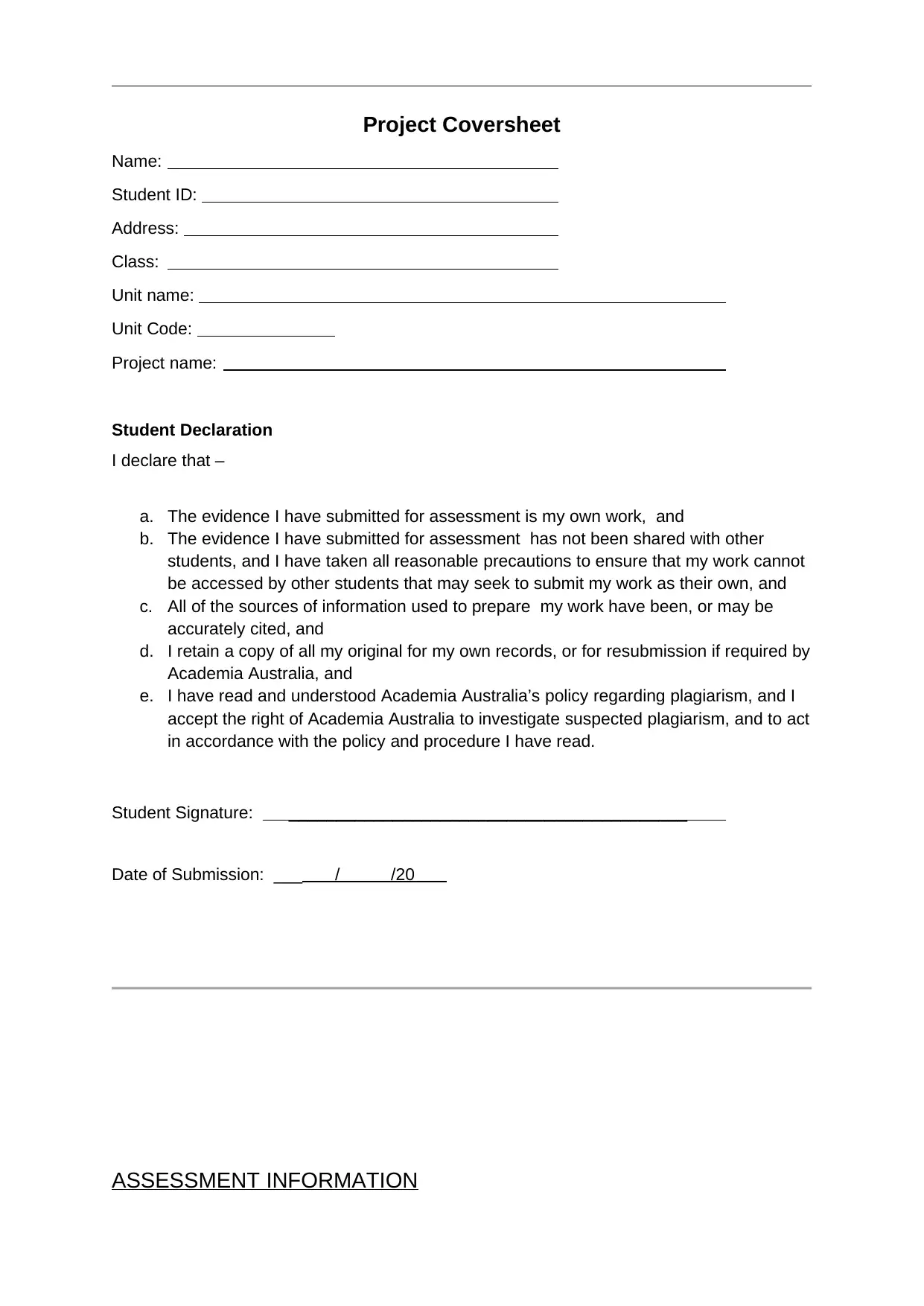
Project Coversheet
Name:
Student ID:
Address:
Class:
Unit name:
Unit Code:
Project name:
Student Declaration
I declare that –
a. The evidence I have submitted for assessment is my own work, and
b. The evidence I have submitted for assessment has not been shared with other
students, and I have taken all reasonable precautions to ensure that my work cannot
be accessed by other students that may seek to submit my work as their own, and
c. All of the sources of information used to prepare my work have been, or may be
accurately cited, and
d. I retain a copy of all my original for my own records, or for resubmission if required by
Academia Australia, and
e. I have read and understood Academia Australia’s policy regarding plagiarism, and I
accept the right of Academia Australia to investigate suspected plagiarism, and to act
in accordance with the policy and procedure I have read.
Student Signature: __________________________________________
Date of Submission: ___ / /20
ASSESSMENT INFORMATION
Name:
Student ID:
Address:
Class:
Unit name:
Unit Code:
Project name:
Student Declaration
I declare that –
a. The evidence I have submitted for assessment is my own work, and
b. The evidence I have submitted for assessment has not been shared with other
students, and I have taken all reasonable precautions to ensure that my work cannot
be accessed by other students that may seek to submit my work as their own, and
c. All of the sources of information used to prepare my work have been, or may be
accurately cited, and
d. I retain a copy of all my original for my own records, or for resubmission if required by
Academia Australia, and
e. I have read and understood Academia Australia’s policy regarding plagiarism, and I
accept the right of Academia Australia to investigate suspected plagiarism, and to act
in accordance with the policy and procedure I have read.
Student Signature: __________________________________________
Date of Submission: ___ / /20
ASSESSMENT INFORMATION
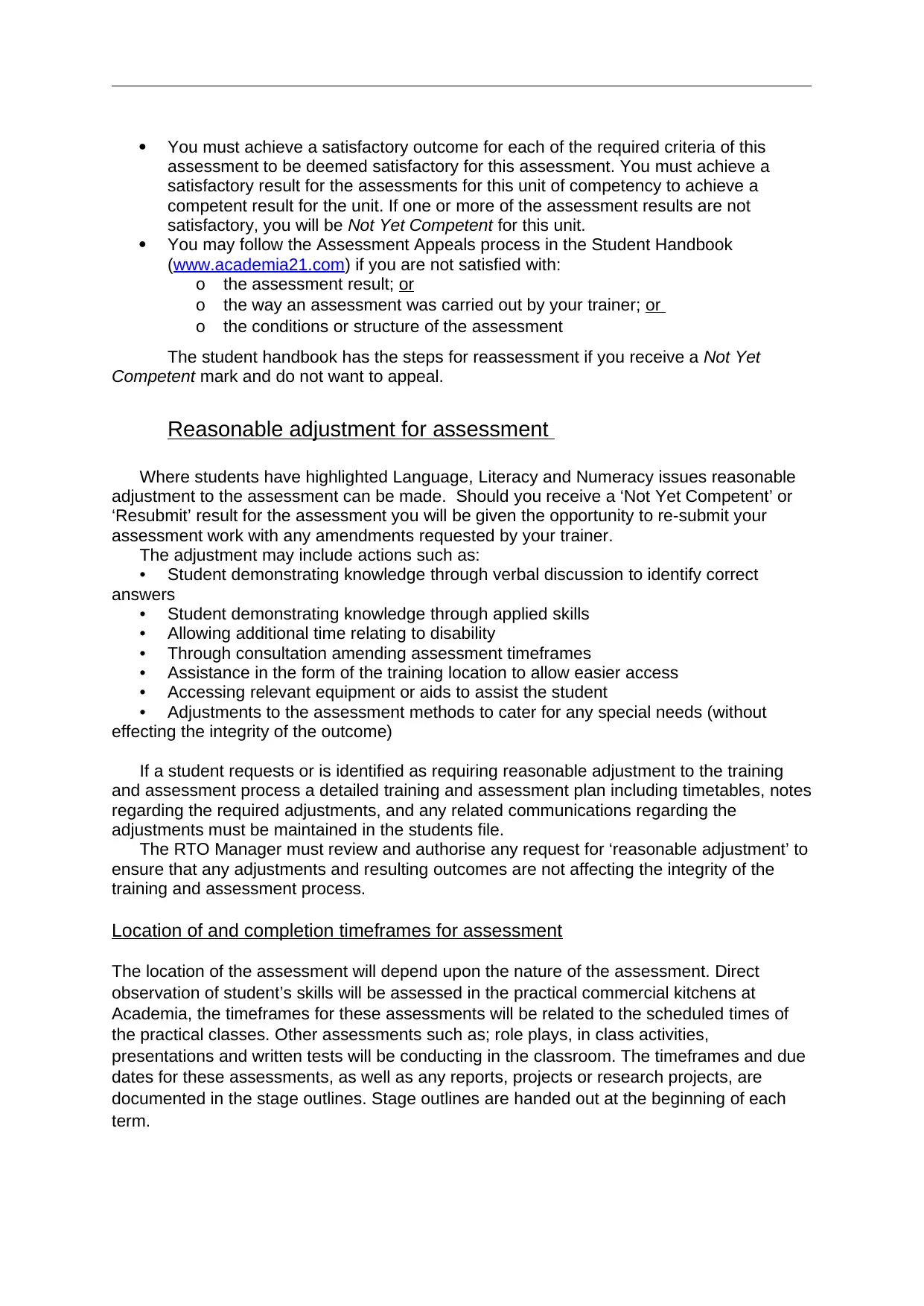
You must achieve a satisfactory outcome for each of the required criteria of this
assessment to be deemed satisfactory for this assessment. You must achieve a
satisfactory result for the assessments for this unit of competency to achieve a
competent result for the unit. If one or more of the assessment results are not
satisfactory, you will be Not Yet Competent for this unit.
You may follow the Assessment Appeals process in the Student Handbook
(www.academia21.com) if you are not satisfied with:
o the assessment result; or
o the way an assessment was carried out by your trainer; or
o the conditions or structure of the assessment
The student handbook has the steps for reassessment if you receive a Not Yet
Competent mark and do not want to appeal.
Reasonable adjustment for assessment
Where students have highlighted Language, Literacy and Numeracy issues reasonable
adjustment to the assessment can be made. Should you receive a ‘Not Yet Competent’ or
‘Resubmit’ result for the assessment you will be given the opportunity to re-submit your
assessment work with any amendments requested by your trainer.
The adjustment may include actions such as:
• Student demonstrating knowledge through verbal discussion to identify correct
answers
• Student demonstrating knowledge through applied skills
• Allowing additional time relating to disability
• Through consultation amending assessment timeframes
• Assistance in the form of the training location to allow easier access
• Accessing relevant equipment or aids to assist the student
• Adjustments to the assessment methods to cater for any special needs (without
effecting the integrity of the outcome)
If a student requests or is identified as requiring reasonable adjustment to the training
and assessment process a detailed training and assessment plan including timetables, notes
regarding the required adjustments, and any related communications regarding the
adjustments must be maintained in the students file.
The RTO Manager must review and authorise any request for ‘reasonable adjustment’ to
ensure that any adjustments and resulting outcomes are not affecting the integrity of the
training and assessment process.
Location of and completion timeframes for assessment
The location of the assessment will depend upon the nature of the assessment. Direct
observation of student’s skills will be assessed in the practical commercial kitchens at
Academia, the timeframes for these assessments will be related to the scheduled times of
the practical classes. Other assessments such as; role plays, in class activities,
presentations and written tests will be conducting in the classroom. The timeframes and due
dates for these assessments, as well as any reports, projects or research projects, are
documented in the stage outlines. Stage outlines are handed out at the beginning of each
term.
assessment to be deemed satisfactory for this assessment. You must achieve a
satisfactory result for the assessments for this unit of competency to achieve a
competent result for the unit. If one or more of the assessment results are not
satisfactory, you will be Not Yet Competent for this unit.
You may follow the Assessment Appeals process in the Student Handbook
(www.academia21.com) if you are not satisfied with:
o the assessment result; or
o the way an assessment was carried out by your trainer; or
o the conditions or structure of the assessment
The student handbook has the steps for reassessment if you receive a Not Yet
Competent mark and do not want to appeal.
Reasonable adjustment for assessment
Where students have highlighted Language, Literacy and Numeracy issues reasonable
adjustment to the assessment can be made. Should you receive a ‘Not Yet Competent’ or
‘Resubmit’ result for the assessment you will be given the opportunity to re-submit your
assessment work with any amendments requested by your trainer.
The adjustment may include actions such as:
• Student demonstrating knowledge through verbal discussion to identify correct
answers
• Student demonstrating knowledge through applied skills
• Allowing additional time relating to disability
• Through consultation amending assessment timeframes
• Assistance in the form of the training location to allow easier access
• Accessing relevant equipment or aids to assist the student
• Adjustments to the assessment methods to cater for any special needs (without
effecting the integrity of the outcome)
If a student requests or is identified as requiring reasonable adjustment to the training
and assessment process a detailed training and assessment plan including timetables, notes
regarding the required adjustments, and any related communications regarding the
adjustments must be maintained in the students file.
The RTO Manager must review and authorise any request for ‘reasonable adjustment’ to
ensure that any adjustments and resulting outcomes are not affecting the integrity of the
training and assessment process.
Location of and completion timeframes for assessment
The location of the assessment will depend upon the nature of the assessment. Direct
observation of student’s skills will be assessed in the practical commercial kitchens at
Academia, the timeframes for these assessments will be related to the scheduled times of
the practical classes. Other assessments such as; role plays, in class activities,
presentations and written tests will be conducting in the classroom. The timeframes and due
dates for these assessments, as well as any reports, projects or research projects, are
documented in the stage outlines. Stage outlines are handed out at the beginning of each
term.
⊘ This is a preview!⊘
Do you want full access?
Subscribe today to unlock all pages.

Trusted by 1+ million students worldwide
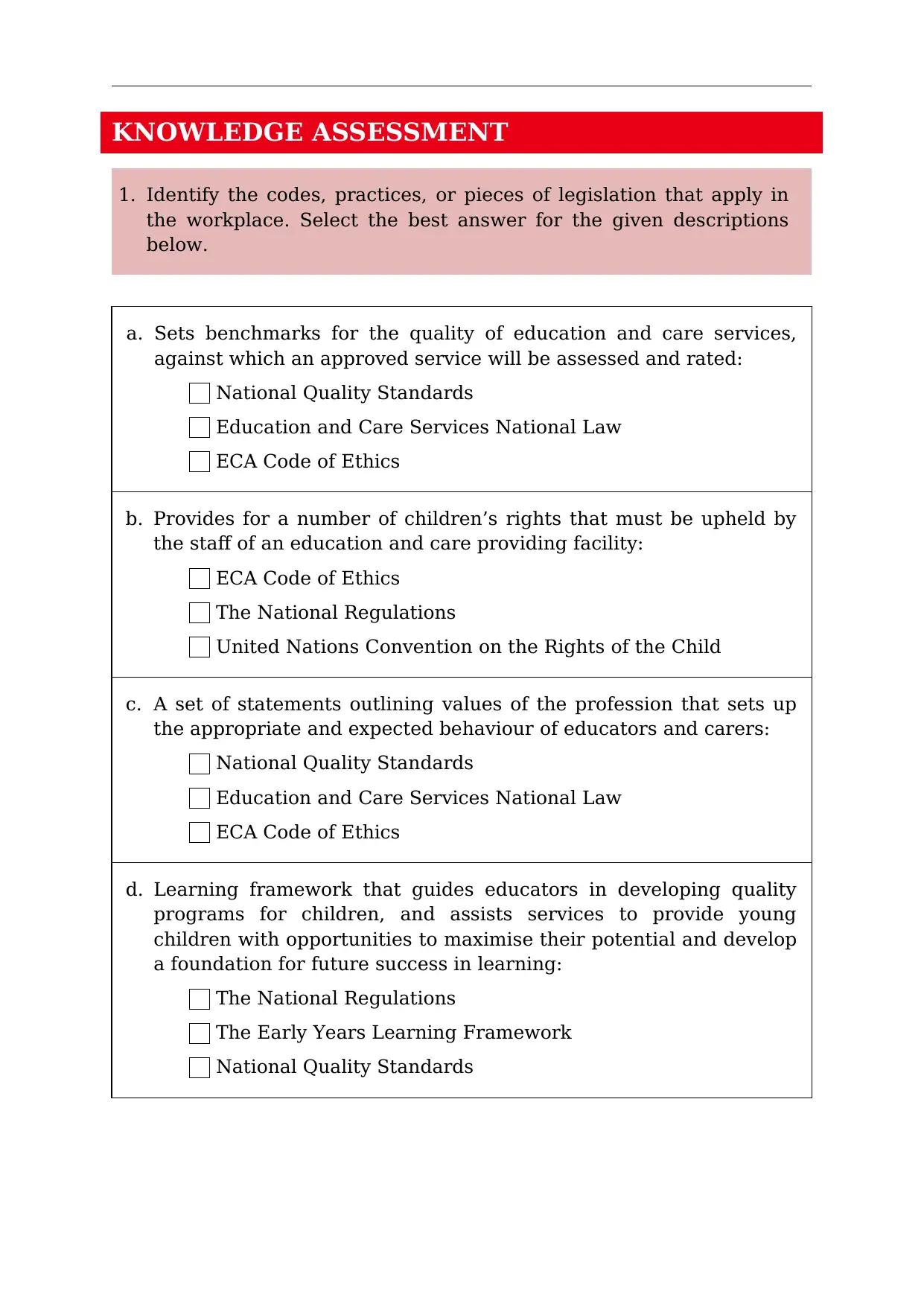
KNOWLEDGE ASSESSMENT
1. Identify the codes, practices, or pieces of legislation that apply in
the workplace. Select the best answer for the given descriptions
below.
a. Sets benchmarks for the quality of education and care services,
against which an approved service will be assessed and rated:
National Quality Standards
Education and Care Services National Law
ECA Code of Ethics
b. Provides for a number of children’s rights that must be upheld by
the staff of an education and care providing facility:
ECA Code of Ethics
The National Regulations
United Nations Convention on the Rights of the Child
c. A set of statements outlining values of the profession that sets up
the appropriate and expected behaviour of educators and carers:
National Quality Standards
Education and Care Services National Law
ECA Code of Ethics
d. Learning framework that guides educators in developing quality
programs for children, and assists services to provide young
children with opportunities to maximise their potential and develop
a foundation for future success in learning:
The National Regulations
The Early Years Learning Framework
National Quality Standards
1. Identify the codes, practices, or pieces of legislation that apply in
the workplace. Select the best answer for the given descriptions
below.
a. Sets benchmarks for the quality of education and care services,
against which an approved service will be assessed and rated:
National Quality Standards
Education and Care Services National Law
ECA Code of Ethics
b. Provides for a number of children’s rights that must be upheld by
the staff of an education and care providing facility:
ECA Code of Ethics
The National Regulations
United Nations Convention on the Rights of the Child
c. A set of statements outlining values of the profession that sets up
the appropriate and expected behaviour of educators and carers:
National Quality Standards
Education and Care Services National Law
ECA Code of Ethics
d. Learning framework that guides educators in developing quality
programs for children, and assists services to provide young
children with opportunities to maximise their potential and develop
a foundation for future success in learning:
The National Regulations
The Early Years Learning Framework
National Quality Standards
Paraphrase This Document
Need a fresh take? Get an instant paraphrase of this document with our AI Paraphraser
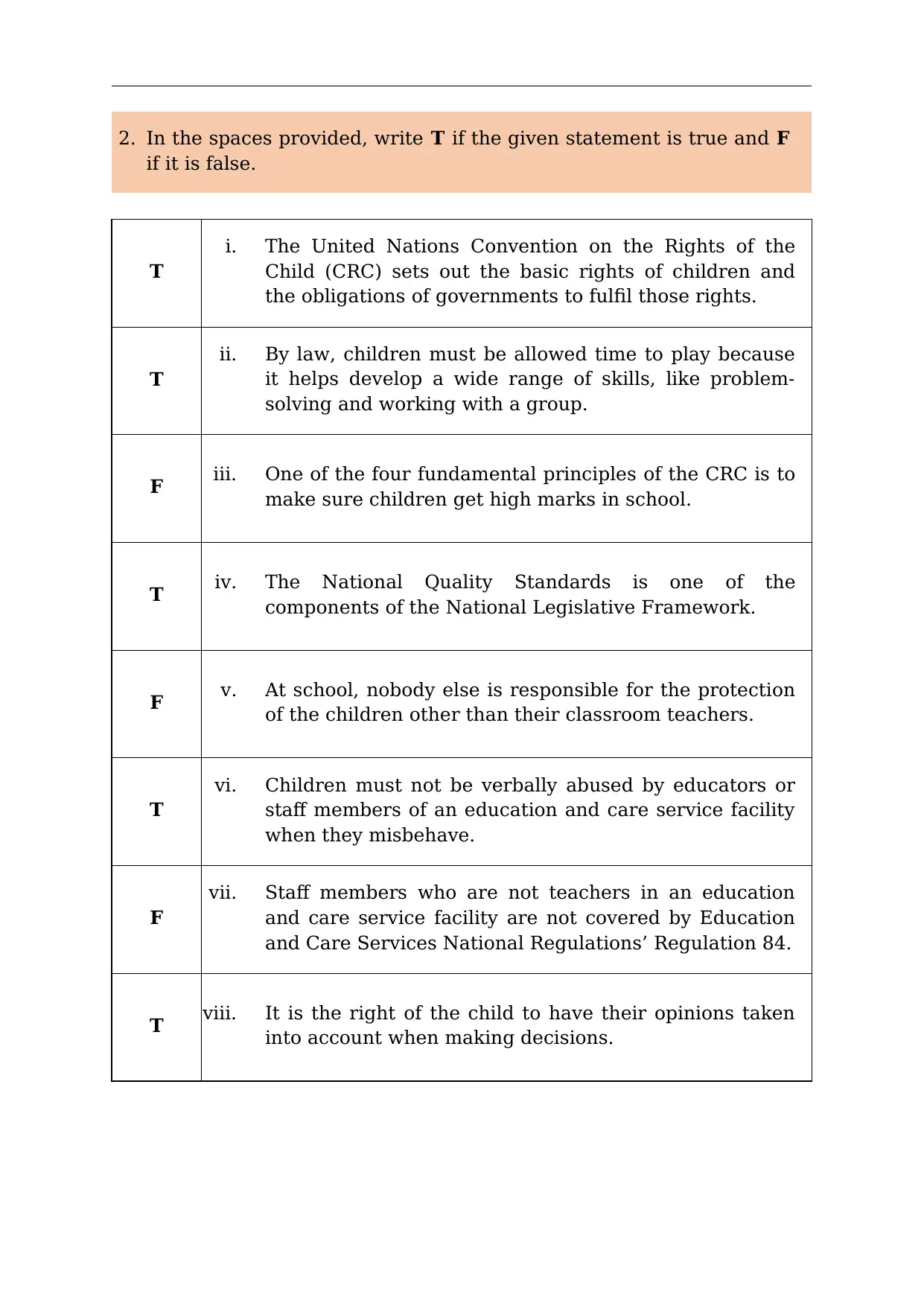
2. In the spaces provided, write T if the given statement is true and F
if it is false.
T
i. The United Nations Convention on the Rights of the
Child (CRC) sets out the basic rights of children and
the obligations of governments to fulfil those rights.
T
ii. By law, children must be allowed time to play because
it helps develop a wide range of skills, like problem-
solving and working with a group.
F iii. One of the four fundamental principles of the CRC is to
make sure children get high marks in school.
T iv. The National Quality Standards is one of the
components of the National Legislative Framework.
F v. At school, nobody else is responsible for the protection
of the children other than their classroom teachers.
T
vi. Children must not be verbally abused by educators or
staff members of an education and care service facility
when they misbehave.
F
vii. Staff members who are not teachers in an education
and care service facility are not covered by Education
and Care Services National Regulations’ Regulation 84.
T viii. It is the right of the child to have their opinions taken
into account when making decisions.
if it is false.
T
i. The United Nations Convention on the Rights of the
Child (CRC) sets out the basic rights of children and
the obligations of governments to fulfil those rights.
T
ii. By law, children must be allowed time to play because
it helps develop a wide range of skills, like problem-
solving and working with a group.
F iii. One of the four fundamental principles of the CRC is to
make sure children get high marks in school.
T iv. The National Quality Standards is one of the
components of the National Legislative Framework.
F v. At school, nobody else is responsible for the protection
of the children other than their classroom teachers.
T
vi. Children must not be verbally abused by educators or
staff members of an education and care service facility
when they misbehave.
F
vii. Staff members who are not teachers in an education
and care service facility are not covered by Education
and Care Services National Regulations’ Regulation 84.
T viii. It is the right of the child to have their opinions taken
into account when making decisions.
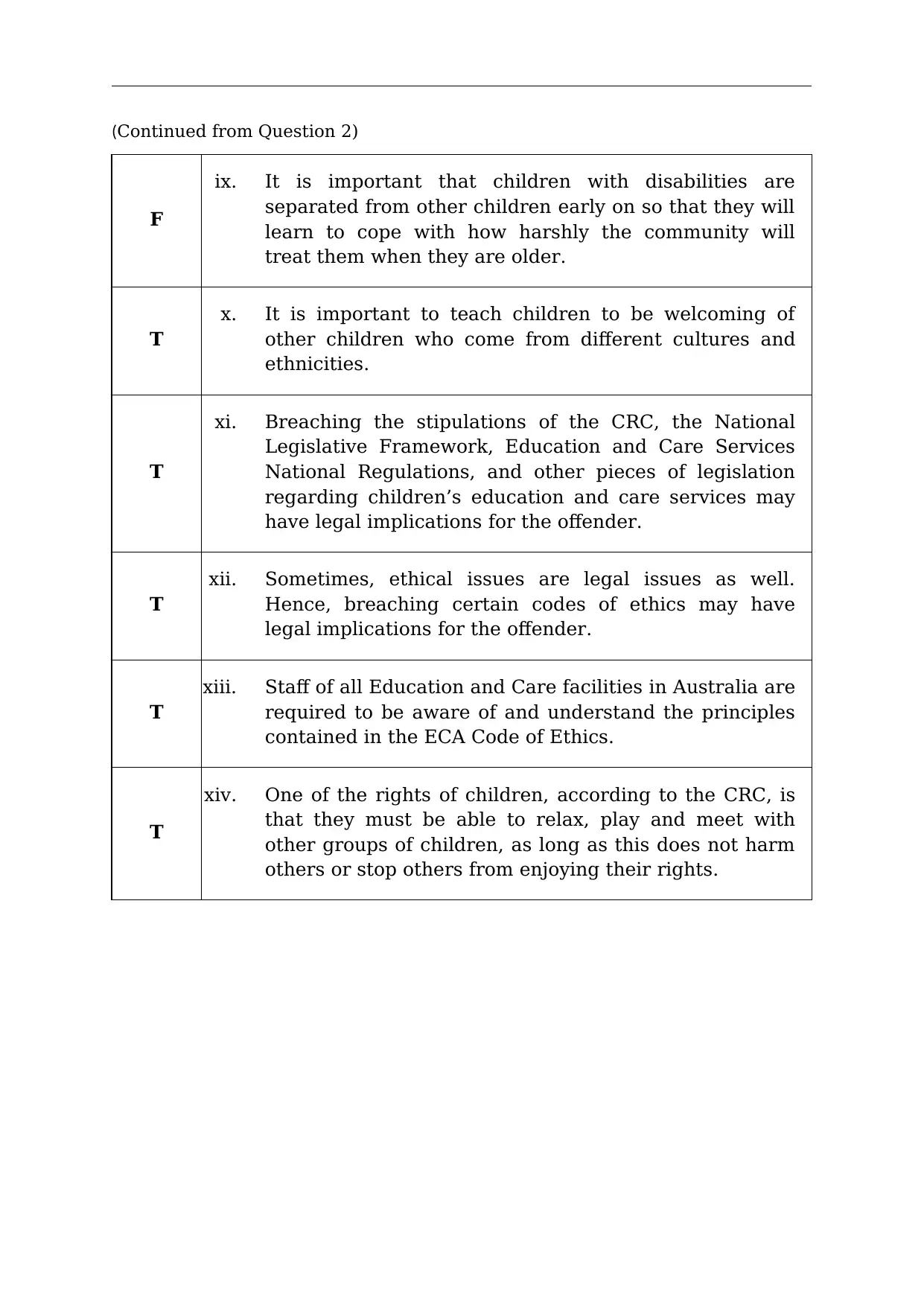
(Continued from Question 2)
F
ix. It is important that children with disabilities are
separated from other children early on so that they will
learn to cope with how harshly the community will
treat them when they are older.
T
x. It is important to teach children to be welcoming of
other children who come from different cultures and
ethnicities.
T
xi. Breaching the stipulations of the CRC, the National
Legislative Framework, Education and Care Services
National Regulations, and other pieces of legislation
regarding children’s education and care services may
have legal implications for the offender.
T
xii. Sometimes, ethical issues are legal issues as well.
Hence, breaching certain codes of ethics may have
legal implications for the offender.
T
xiii. Staff of all Education and Care facilities in Australia are
required to be aware of and understand the principles
contained in the ECA Code of Ethics.
T
xiv. One of the rights of children, according to the CRC, is
that they must be able to relax, play and meet with
other groups of children, as long as this does not harm
others or stop others from enjoying their rights.
F
ix. It is important that children with disabilities are
separated from other children early on so that they will
learn to cope with how harshly the community will
treat them when they are older.
T
x. It is important to teach children to be welcoming of
other children who come from different cultures and
ethnicities.
T
xi. Breaching the stipulations of the CRC, the National
Legislative Framework, Education and Care Services
National Regulations, and other pieces of legislation
regarding children’s education and care services may
have legal implications for the offender.
T
xii. Sometimes, ethical issues are legal issues as well.
Hence, breaching certain codes of ethics may have
legal implications for the offender.
T
xiii. Staff of all Education and Care facilities in Australia are
required to be aware of and understand the principles
contained in the ECA Code of Ethics.
T
xiv. One of the rights of children, according to the CRC, is
that they must be able to relax, play and meet with
other groups of children, as long as this does not harm
others or stop others from enjoying their rights.
⊘ This is a preview!⊘
Do you want full access?
Subscribe today to unlock all pages.

Trusted by 1+ million students worldwide
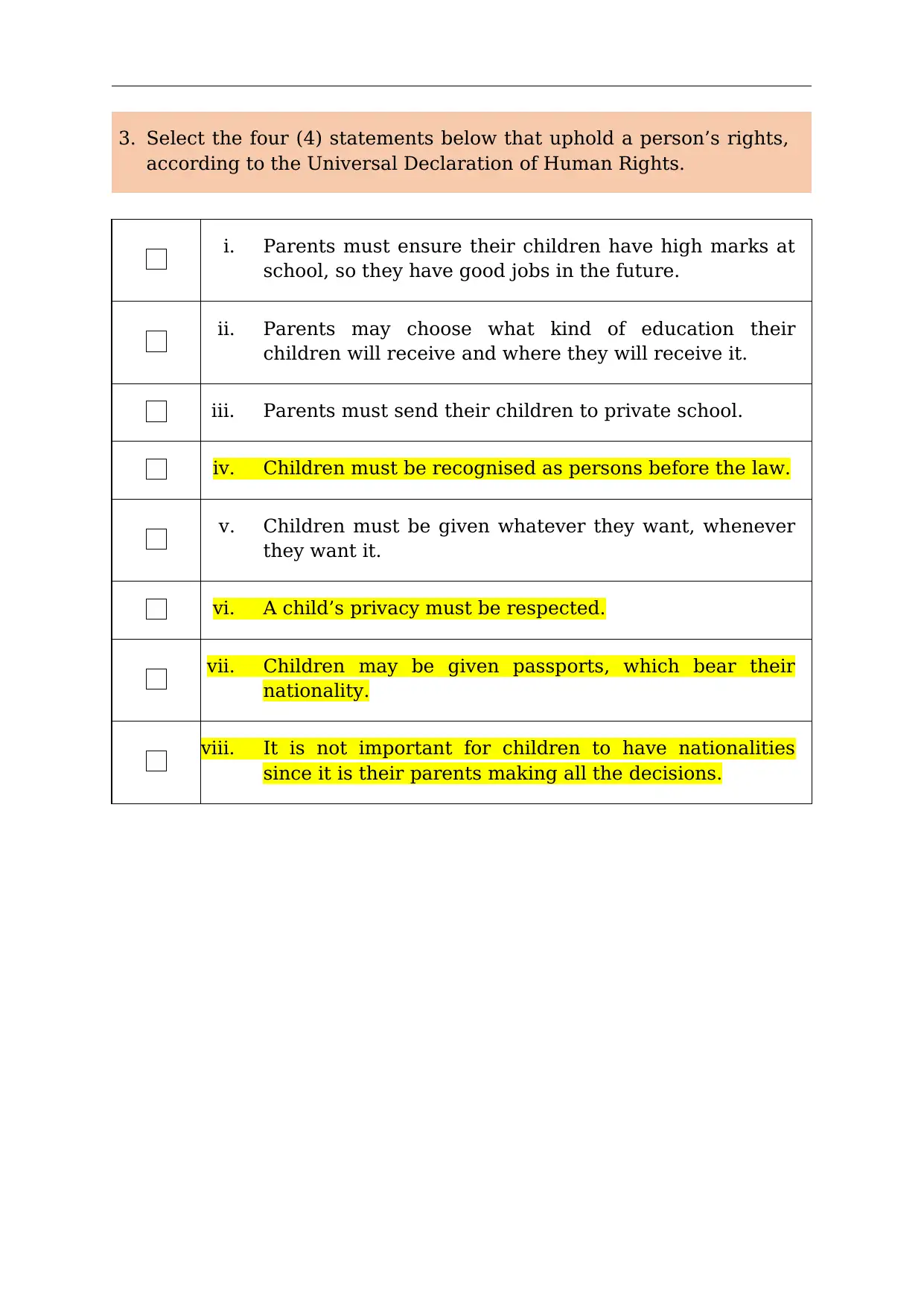
3. Select the four (4) statements below that uphold a person’s rights,
according to the Universal Declaration of Human Rights.
i. Parents must ensure their children have high marks at
school, so they have good jobs in the future.
ii. Parents may choose what kind of education their
children will receive and where they will receive it.
iii. Parents must send their children to private school.
iv. Children must be recognised as persons before the law.
v. Children must be given whatever they want, whenever
they want it.
vi. A child’s privacy must be respected.
vii. Children may be given passports, which bear their
nationality.
viii. It is not important for children to have nationalities
since it is their parents making all the decisions.
according to the Universal Declaration of Human Rights.
i. Parents must ensure their children have high marks at
school, so they have good jobs in the future.
ii. Parents may choose what kind of education their
children will receive and where they will receive it.
iii. Parents must send their children to private school.
iv. Children must be recognised as persons before the law.
v. Children must be given whatever they want, whenever
they want it.
vi. A child’s privacy must be respected.
vii. Children may be given passports, which bear their
nationality.
viii. It is not important for children to have nationalities
since it is their parents making all the decisions.
Paraphrase This Document
Need a fresh take? Get an instant paraphrase of this document with our AI Paraphraser
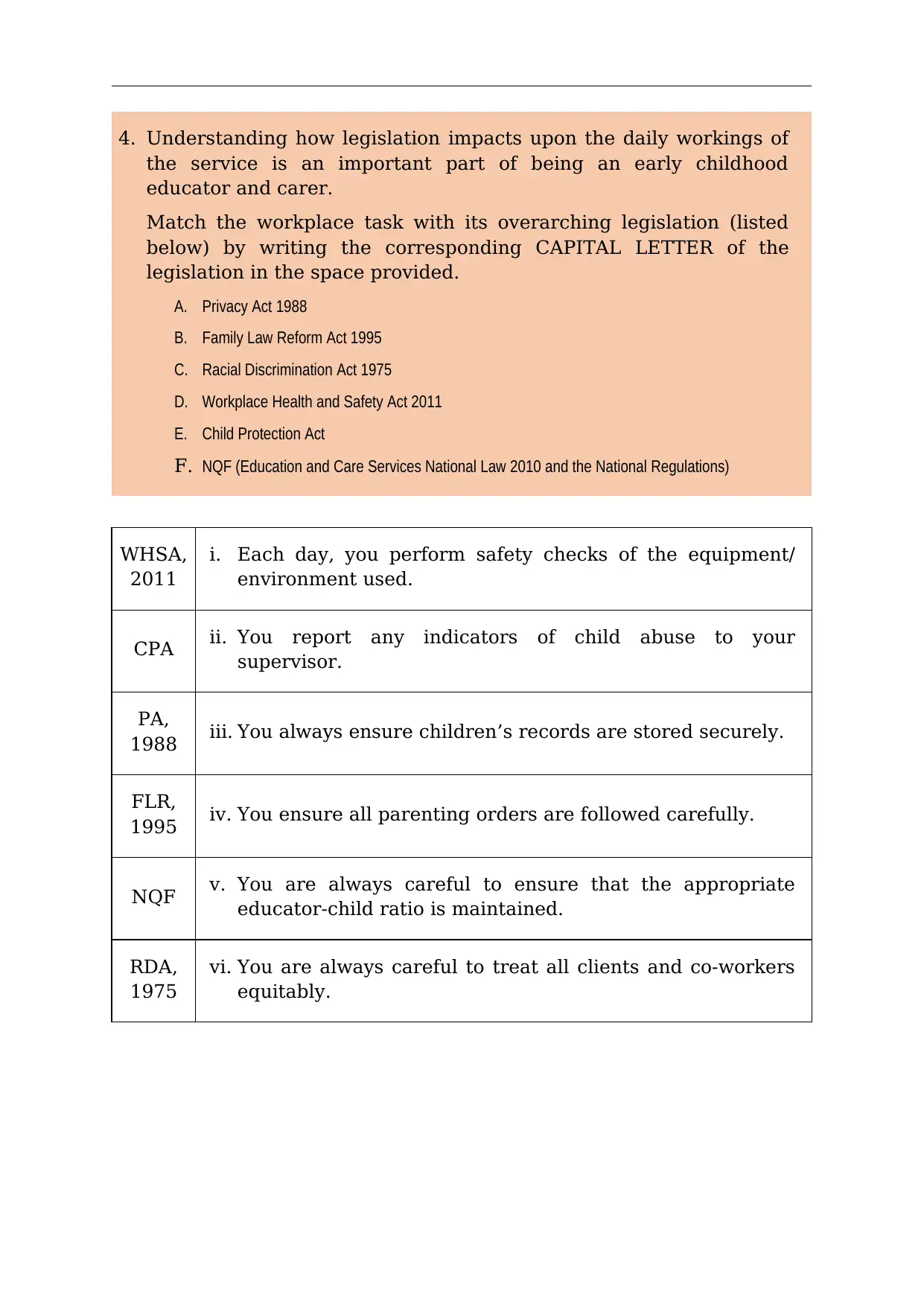
4. Understanding how legislation impacts upon the daily workings of
the service is an important part of being an early childhood
educator and carer.
Match the workplace task with its overarching legislation (listed
below) by writing the corresponding CAPITAL LETTER of the
legislation in the space provided.
A. Privacy Act 1988
B. Family Law Reform Act 1995
C. Racial Discrimination Act 1975
D. Workplace Health and Safety Act 2011
E. Child Protection Act
F. NQF (Education and Care Services National Law 2010 and the National Regulations)
WHSA,
2011
i. Each day, you perform safety checks of the equipment/
environment used.
CPA ii. You report any indicators of child abuse to your
supervisor.
PA,
1988 iii. You always ensure children’s records are stored securely.
FLR,
1995 iv. You ensure all parenting orders are followed carefully.
NQF v. You are always careful to ensure that the appropriate
educator-child ratio is maintained.
RDA,
1975
vi. You are always careful to treat all clients and co-workers
equitably.
the service is an important part of being an early childhood
educator and carer.
Match the workplace task with its overarching legislation (listed
below) by writing the corresponding CAPITAL LETTER of the
legislation in the space provided.
A. Privacy Act 1988
B. Family Law Reform Act 1995
C. Racial Discrimination Act 1975
D. Workplace Health and Safety Act 2011
E. Child Protection Act
F. NQF (Education and Care Services National Law 2010 and the National Regulations)
WHSA,
2011
i. Each day, you perform safety checks of the equipment/
environment used.
CPA ii. You report any indicators of child abuse to your
supervisor.
PA,
1988 iii. You always ensure children’s records are stored securely.
FLR,
1995 iv. You ensure all parenting orders are followed carefully.
NQF v. You are always careful to ensure that the appropriate
educator-child ratio is maintained.
RDA,
1975
vi. You are always careful to treat all clients and co-workers
equitably.

5. There are several different frameworks that guide your conduct as
an early childhood educator and carer. Answer the following
questions about early childhood education frameworks.
a. Where must copies of Belonging, Being and Becoming: The Early
Years Learning Framework (EYLF) and My Time, Our Place:
Framework for School Age Care (FSAC) be located, to be accessible
to educators? Select one (1).
Educators can only access copies online
Copies must be located at the centre
Educators must be given their own copy by the centre
b. All states/territories except Victoria now follow the EYLF and the
FASC. What is the name of the framework implemented in Victoria?
Write the full name below:
VICTORIAN EARLY YEARS LEARNING AND DEVELOPMENT
FRAMEWORK
c. Children and families are stakeholders in the development of
policies and procedures in an education and care centre. True or
false?
True
False
d. In each state, a Regulatory Authority will be responsible for
administering the National Quality Framework, including
approving, monitoring and quality assessing services. Identify the
State or Territory Regulator in your current location:
Your state or
territory:
Victoria Melbourne
Regulator: Australian Education and Care Quality
Authority (ACECQA).
an early childhood educator and carer. Answer the following
questions about early childhood education frameworks.
a. Where must copies of Belonging, Being and Becoming: The Early
Years Learning Framework (EYLF) and My Time, Our Place:
Framework for School Age Care (FSAC) be located, to be accessible
to educators? Select one (1).
Educators can only access copies online
Copies must be located at the centre
Educators must be given their own copy by the centre
b. All states/territories except Victoria now follow the EYLF and the
FASC. What is the name of the framework implemented in Victoria?
Write the full name below:
VICTORIAN EARLY YEARS LEARNING AND DEVELOPMENT
FRAMEWORK
c. Children and families are stakeholders in the development of
policies and procedures in an education and care centre. True or
false?
True
False
d. In each state, a Regulatory Authority will be responsible for
administering the National Quality Framework, including
approving, monitoring and quality assessing services. Identify the
State or Territory Regulator in your current location:
Your state or
territory:
Victoria Melbourne
Regulator: Australian Education and Care Quality
Authority (ACECQA).
⊘ This is a preview!⊘
Do you want full access?
Subscribe today to unlock all pages.

Trusted by 1+ million students worldwide
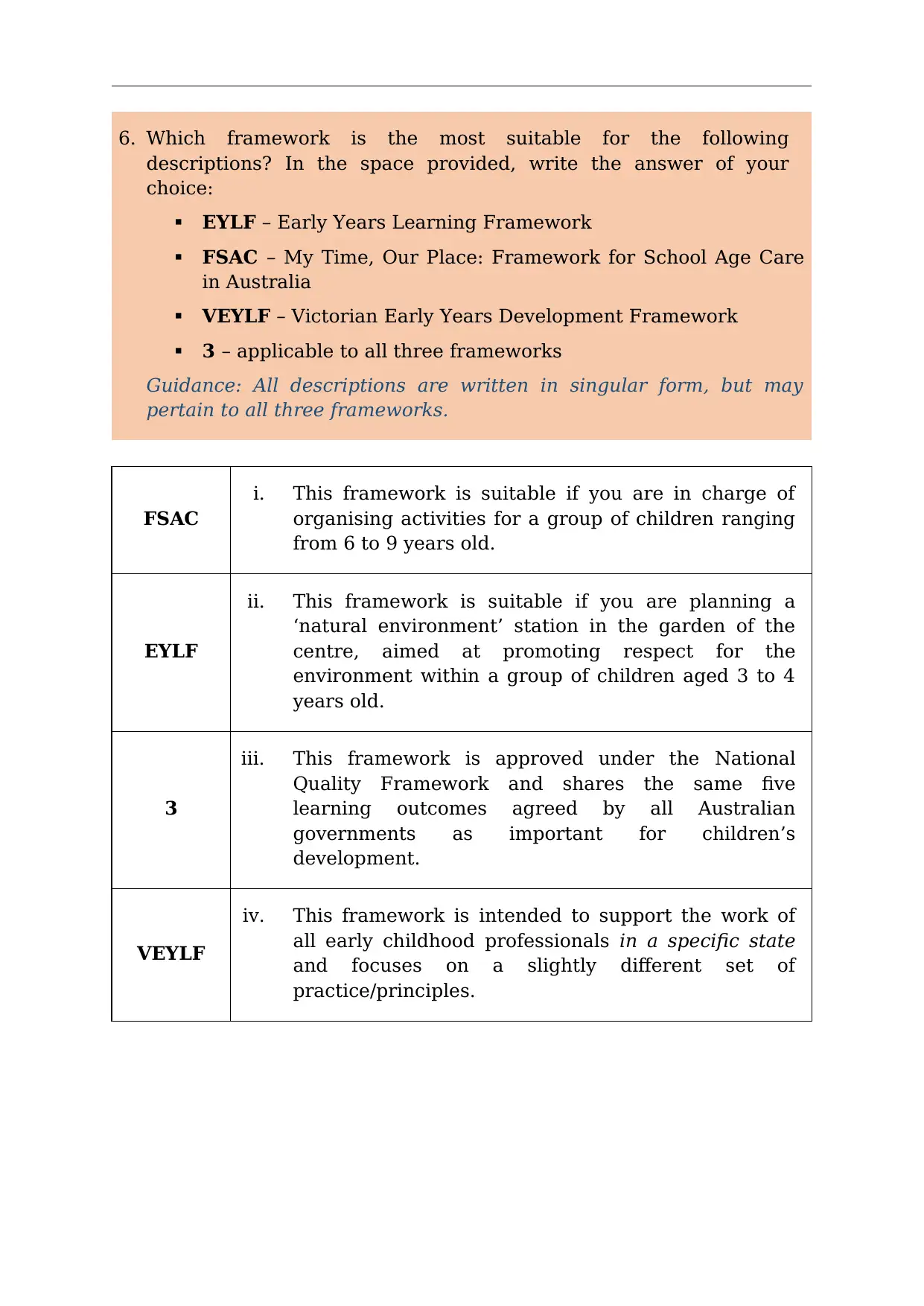
6. Which framework is the most suitable for the following
descriptions? In the space provided, write the answer of your
choice:
EYLF – Early Years Learning Framework
FSAC – My Time, Our Place: Framework for School Age Care
in Australia
VEYLF – Victorian Early Years Development Framework
3 – applicable to all three frameworks
Guidance: All descriptions are written in singular form, but may
pertain to all three frameworks.
FSAC
i. This framework is suitable if you are in charge of
organising activities for a group of children ranging
from 6 to 9 years old.
EYLF
ii. This framework is suitable if you are planning a
‘natural environment’ station in the garden of the
centre, aimed at promoting respect for the
environment within a group of children aged 3 to 4
years old.
3
iii. This framework is approved under the National
Quality Framework and shares the same five
learning outcomes agreed by all Australian
governments as important for children’s
development.
VEYLF
iv. This framework is intended to support the work of
all early childhood professionals in a specific state
and focuses on a slightly different set of
practice/principles.
descriptions? In the space provided, write the answer of your
choice:
EYLF – Early Years Learning Framework
FSAC – My Time, Our Place: Framework for School Age Care
in Australia
VEYLF – Victorian Early Years Development Framework
3 – applicable to all three frameworks
Guidance: All descriptions are written in singular form, but may
pertain to all three frameworks.
FSAC
i. This framework is suitable if you are in charge of
organising activities for a group of children ranging
from 6 to 9 years old.
EYLF
ii. This framework is suitable if you are planning a
‘natural environment’ station in the garden of the
centre, aimed at promoting respect for the
environment within a group of children aged 3 to 4
years old.
3
iii. This framework is approved under the National
Quality Framework and shares the same five
learning outcomes agreed by all Australian
governments as important for children’s
development.
VEYLF
iv. This framework is intended to support the work of
all early childhood professionals in a specific state
and focuses on a slightly different set of
practice/principles.
Paraphrase This Document
Need a fresh take? Get an instant paraphrase of this document with our AI Paraphraser
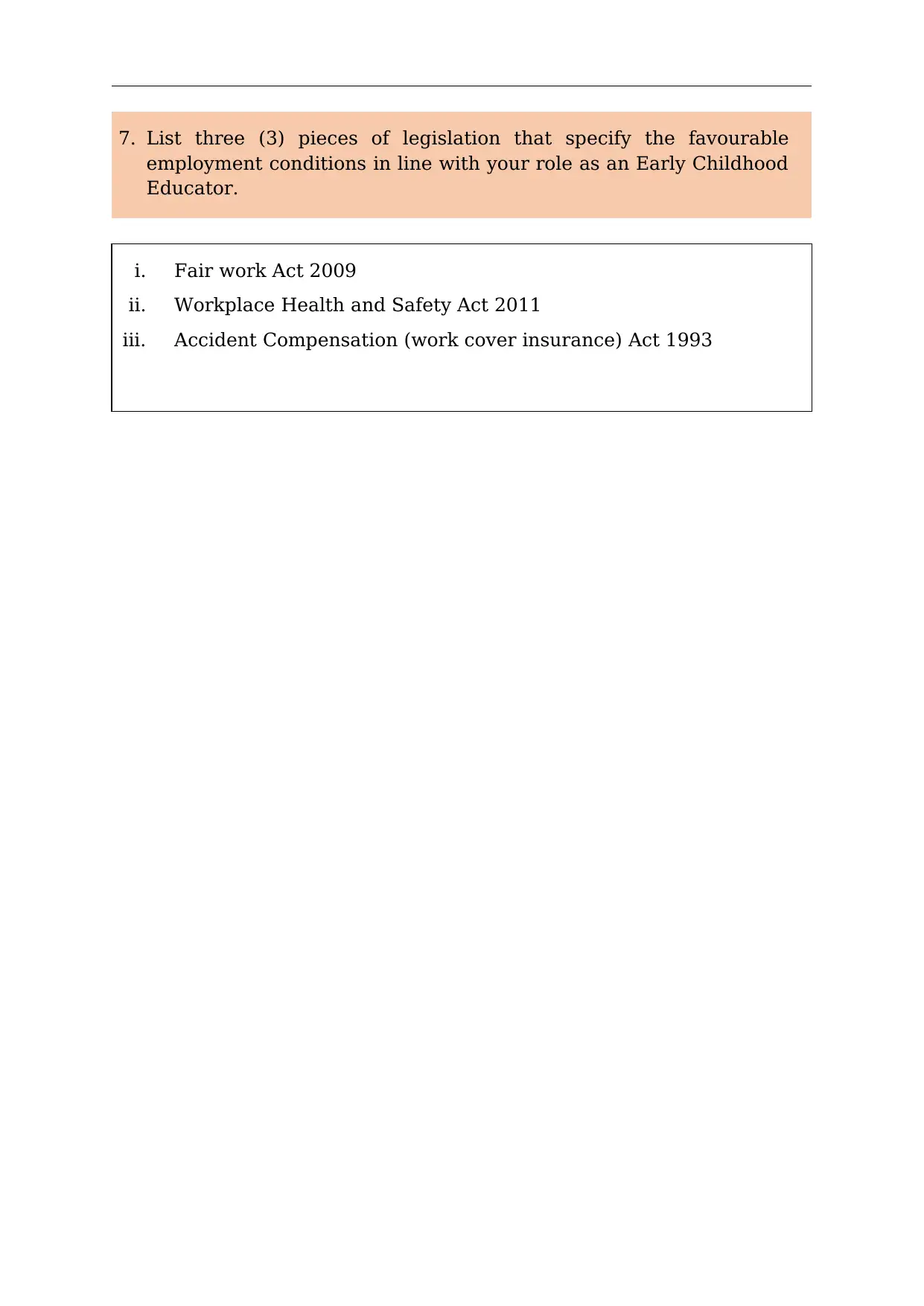
7. List three (3) pieces of legislation that specify the favourable
employment conditions in line with your role as an Early Childhood
Educator.
i. Fair work Act 2009
ii. Workplace Health and Safety Act 2011
iii. Accident Compensation (work cover insurance) Act 1993
employment conditions in line with your role as an Early Childhood
Educator.
i. Fair work Act 2009
ii. Workplace Health and Safety Act 2011
iii. Accident Compensation (work cover insurance) Act 1993
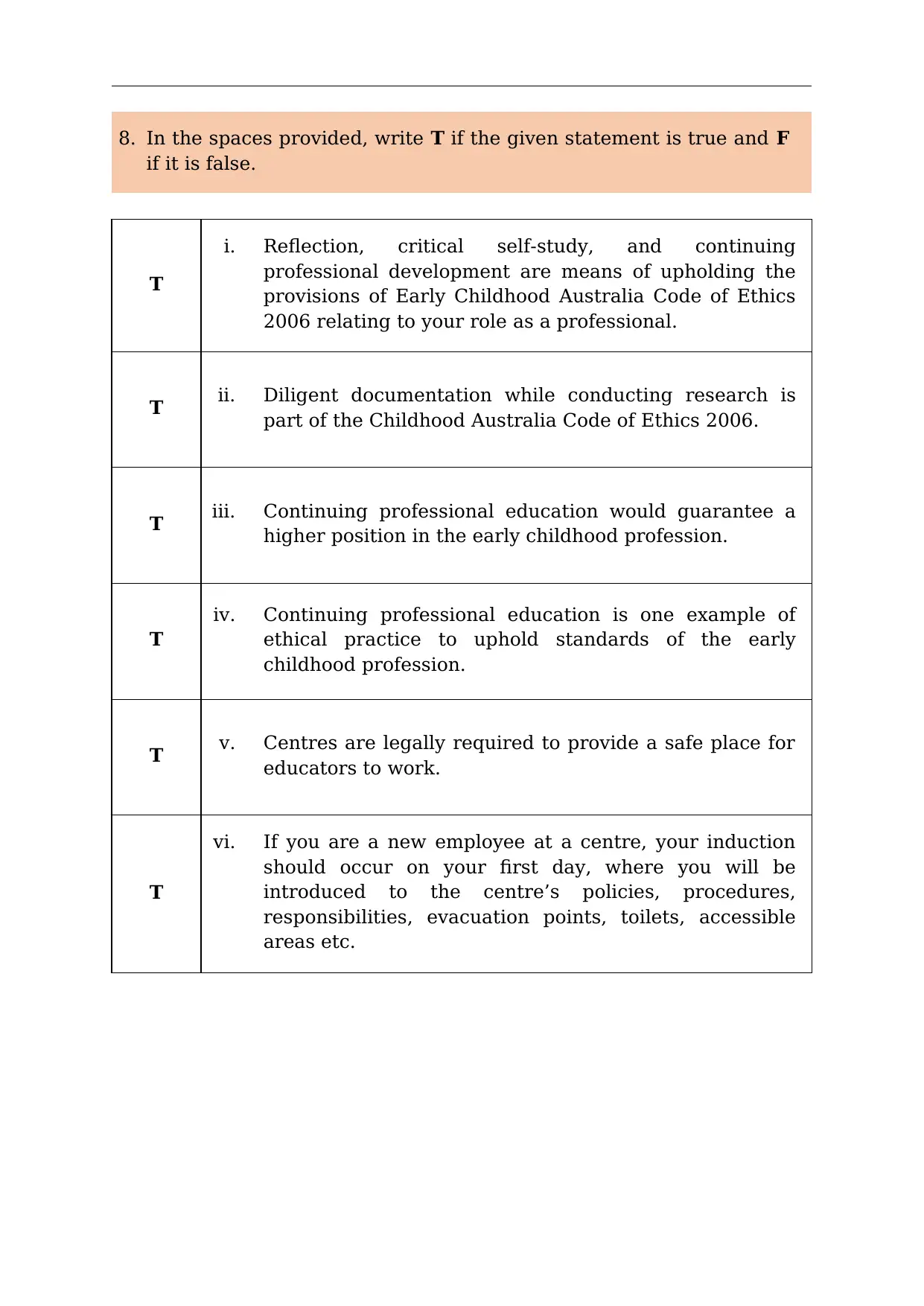
8. In the spaces provided, write T if the given statement is true and F
if it is false.
T
i. Reflection, critical self-study, and continuing
professional development are means of upholding the
provisions of Early Childhood Australia Code of Ethics
2006 relating to your role as a professional.
T ii. Diligent documentation while conducting research is
part of the Childhood Australia Code of Ethics 2006.
T iii. Continuing professional education would guarantee a
higher position in the early childhood profession.
T
iv. Continuing professional education is one example of
ethical practice to uphold standards of the early
childhood profession.
T v. Centres are legally required to provide a safe place for
educators to work.
T
vi. If you are a new employee at a centre, your induction
should occur on your first day, where you will be
introduced to the centre’s policies, procedures,
responsibilities, evacuation points, toilets, accessible
areas etc.
if it is false.
T
i. Reflection, critical self-study, and continuing
professional development are means of upholding the
provisions of Early Childhood Australia Code of Ethics
2006 relating to your role as a professional.
T ii. Diligent documentation while conducting research is
part of the Childhood Australia Code of Ethics 2006.
T iii. Continuing professional education would guarantee a
higher position in the early childhood profession.
T
iv. Continuing professional education is one example of
ethical practice to uphold standards of the early
childhood profession.
T v. Centres are legally required to provide a safe place for
educators to work.
T
vi. If you are a new employee at a centre, your induction
should occur on your first day, where you will be
introduced to the centre’s policies, procedures,
responsibilities, evacuation points, toilets, accessible
areas etc.
⊘ This is a preview!⊘
Do you want full access?
Subscribe today to unlock all pages.

Trusted by 1+ million students worldwide
1 out of 30
Related Documents
Your All-in-One AI-Powered Toolkit for Academic Success.
+13062052269
info@desklib.com
Available 24*7 on WhatsApp / Email
![[object Object]](/_next/static/media/star-bottom.7253800d.svg)
Unlock your academic potential
Copyright © 2020–2026 A2Z Services. All Rights Reserved. Developed and managed by ZUCOL.




